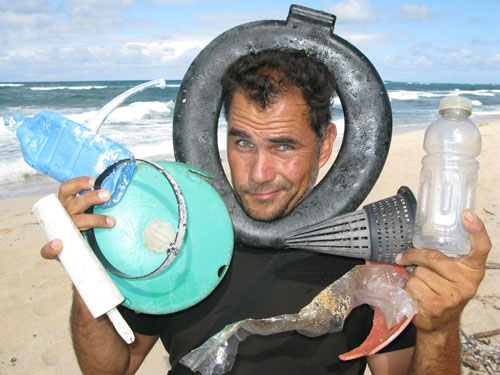FAYETTEVILLE, Ark. – Marcus Eriksen, the co-founder and executive director of the 5 Gyres Institute, will give an illustrated talk on “Saving Our Seas: The Perils of Plastic Pollution in the Marine Environment” from 5:30 to 6:30 p.m. Wednesday, April 3, in Giffels Auditorium in Old Main. The talk is free and open to the public.
Eriksen is a scientist-adventurer-activist-author who has worked tirelessly for the past decade to focus attention on the global distribution and ecological impacts of plastic marine pollution. This interest began in 2000 when Eriksen traveled to Midway Atoll in the Pacific Ocean and discovered hundreds of Laysan Albatross carcasses with plastic bits and particles pouring from their stomachs.
“Dr. Eriksen is my former graduate student, and I have been delighted to see how he has used his skills in science communication to build awareness of a major environmental challenge that for many may be out of sight and out of mind,” said William F. McComas, holder of the Parks Family Professorship in Science Education in the College of Education and Health Professions. “His quick sense of humor, his firm grasp of science and his unbridled passion make Marcus Eriksen an important player in modern environmental advocacy.”
Eriksen spent a decade working with educators in zoos and museums and leading expeditions with teachers to excavate dinosaurs in Wyoming before he received his doctorate in science education from University of Southern California in 2003 focusing on the public understanding of science. A few months later, he embarked on a 2,000-mile, five-month journey down the Mississippi River on a homemade raft made of plastic bottles.
The trip resulted in the memoir My River Home (Beacon Press, 2007) which chronicled his Mississippi River experience paralleled with his tour as a Marine in the 1991 Gulf War. In 2008, Eriksen journeyed across the Pacific Ocean from California to Hawaii, this time on JUNK, a raft consisting of 15,000 plastic bottles supporting a Cessna airplane fuselage as a cabin (www.junkraft.com). The journey of 2,600 miles in 88 days brought attention to the work of the 5 Gyres Institute, the Los Angeles organization Eriksen co-founded with his wife, Anna Cummins.
Eriksen says that plastic garbage flows out to sea every day from every watershed in the world, accumulating in “gyres,” which are massive, slowly rotating whirlpools in the oceans. Gyres are created by complex networks along with wind and the earth’s rotation.
Eriksen has lead research expeditions into all five subtropical gyres to discover new garbage patches of plastic pollution. He described the institute’s work in “Tracking Tsunami Flotsam” in the 2012 July/August issue of Natural History magazine.
“We must understand and approach conservation and social justice work as our collective self-preservation – a rationale that crosses all boundaries between all people,” Eriksen said.
Sponsors of the talk are the Parks Family Professorship in Science Education, the Center for Agricultural and Rural Sustainability and the Associated Student Government.
Contacts
William F. McComas, Parks Family Professor of Science Foundation
College of Education and Health Professions
479-575-7525,
Heidi Wells, content writer and strategist
Global Campus
479-879-8760,
